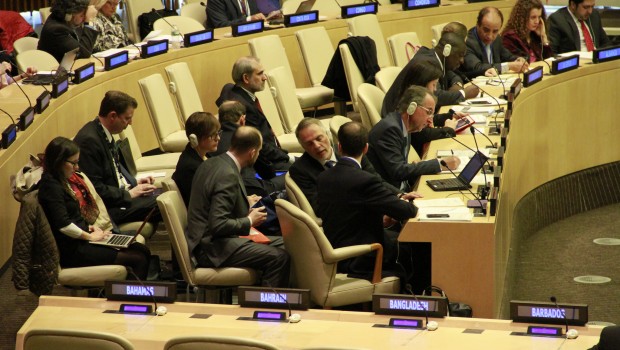Eighty percent of the United Nations membership is trying to be heard. The 2015 NPT Review Conference did not heed their call.
Nine nations have developed nuclear weapons, 16,000 warheads all told. It would be naive to believe nothing could ever go wrong – these are man-made systems, spread out in hundreds of locations, with thousands of operators, involved in far more and far more serious accidents than publically admitted. Nuclear “realists” are blurry-eyed dreamers, after all.
By Leo Hoffmann-Axthelm, ICAN Germany
While the Pope has squarely rejected nuclear deterrence as immoral, debates surrounding it remain highly theological. From the perspective of a non-nuclear weapon states, there are two options. If nuclear deterrence works, they should consider acquiring nuclear weapons, too.
If it doesn’t, the nuclear weapon states are jeopardizing global security and gambling with the very survival of humanity.
The prevailing view is the latter. States are doing their best to put the debate on a rational, scientific footing. The governments of Norway, Mexico and Austria have organized three international conferences on the Humanitarian Impact of Nuclear Weapons, dissecting in excruciating detail the risks associated with nuclear weapons. 158 states attended the last conference – that is far more than the 104 states that registered for the Review Conference of the nuclear non-proliferation treaty (NPT), as many of the 191 signatories no longer attend.
States have tried to make sure the impact of nuclear weapons on human beings – their humanitarian dimensions – is placed at the heart of the nuclear weapons debate in other forums as well, rather than their supposed security benefits as claimed by a minority of states.
To this end, the ‘humanitarian initiative’ held joint statements on the catastrophic humanitarian consequences of nuclear weapons. 160 states joined the last iteration of this statement, delivered by the Austrian Foreign Minister Sebastian Kurz on 27 April 2015. That is 80 percent of the international community. If you add some umbrella states paying lip service to the humanitarian dimension, almost all non-nuclear weapon states in the world are hammering on about the humanitarian consequences of nuclear weapons.
Short Shrift
And yet, nuclear weapon states are giving them short shrift. Security think tanks go on discussing the finer points of the implementation of the same old New START treaty, often failing to even mention this major revolution in the nuclear weapons discourse. The United Nations High Representative for Disarmament Affairs Angela Kane does the rounds repeating the point that one cannot “toss 80 percent of the membership of the United Nations into the water”.
The overwhelming majority of states have gone to great length to voice their frustration. They are upholding their end of the NPT bargain:
not developing nuclear weapons. In return, they expect nuclear weapon states to deliver on their nuclear disarmament obligation under article VI. And yet in the P-5 echo chamber, where nuclear weapon states talk about strategic stability (i.e. the protection of the status quo), they are quite simply ignored.
The five-yearly Review Conference of the Non-Proliferation Treaty is likely to fail to agree on a satisfactory outcome document negotiated in these hours, even though the crushing majority coalesced around the humanitarian initiative. But the five nuclear-armed states worked tirelessly to weaken every paragraph – to their credit, at least they will not overpromise as in 2010, when instead of any progress on nuclear disarmament, 5 years of negotiations yielded merely a “glossary of nuclear terms”.
Yet even a highly progressive outcome document may come too late to rescue the credibility of the NPT as a disarmament forum, which has long been eroded by a never-ending stream of unkept promises and procrastination. The 2010 NPT Action Plan, adopted by consensus, is only the latest example. While the nuclear-armed claim to be seeking a nuclear weapon free world, their investments make it clear beyond any reasonable doubt that they intend to hold on to their security blankets indefinitely.
Hold and pause
Hold and pause. 80 percent of the world’s nations are doing their best to be heard. And yet the Review Conference was unimpressed, proposing a draft outcome document that does not even mention the impending negotiations on a new international treaty to fill the legal gap on the prohibition and elimination of nuclear weapons. This is something over 100 states, a majority of NPT state parties has committed to by associating themselves with the Humanitarian Pledge (formerly Austrian). An initiative of 160 states is not naïve. It is rooted deeply in the realization that democracy has come to nuclear disarmament.
These states know full well nuclear weapons will not be eliminated overnight. It will take many steps, steps that have been agreed to time and again. But they also know that even the most elementary of these steps have not been implemented for decades. The CTBT and FMCT, both pure non-proliferation measures and therefore in the interest of the nuclear-armed states, are stalled since 1996, as is the Conference on Disarmament.
But a treaty banning nuclear weapons may well increase the pressure for the implementation of these long-agreed “building blocks”, increasing human security every step along the way. No one can stop the majority from further codifying international law, as long as they do not do it under rules of procedure that require consensus and thereby award the forces of the status quo a veto.
Non-nuclear weapon states’ concerns have been utterly ignored. It was not enough to speak with one voice. They now have to raise their game. Live up to their responsibilities, and fill the legal gap on the prohibition of nuclear weapons. Negotiations on a treaty banning nuclear weapons must start now.
http://www.icanw.org/campaign-










